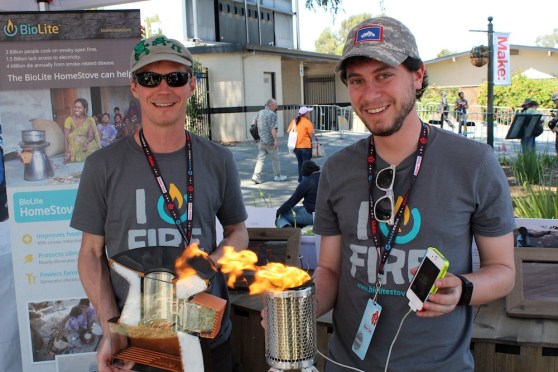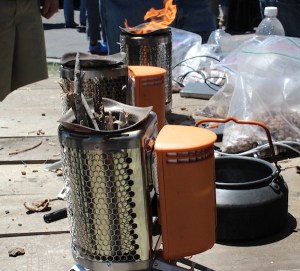Want smarter insights in your inbox? Sign up for our weekly newsletters to get only what matters to enterprise AI, data, and security leaders. Subscribe Now
SAN MATEO, Calif. — Biolite founders Alec Drummond and Jonathan Cedar were working at a design firm in New York when they had the idea to combine a thermoelectric generator with a wood-burning stove.
The result: The CampStove, a portable, $130 stove that can boil a liter of water in about 4.5 minutes while recharging your iPhone — just by burning a handful of twigs. What’s more, its internal fan produces a very efficient reaction, so the fire is very hot and nearly smokeless.
“We started to do the CampStove because it was a really good exercise in understanding how the technology worked,” said Drummond. It also encouraged them to build the device as compactly as possible.
But the company has bigger aims in mind than helping well-heeled backpackers go green. Its big project is the HomeStove, a larger stove meant for use in the developing world, and it is using sales of the CampStove to fuel (ha!) development and testing of the HomeStove.
“The company follows a model that we call ‘parallel innovation,’ where we have one technology that has near-term application in an accessible market recreation and emergency preparedness, and take the revenue to incubate longer-term markets in emerging companies,” said Jonathan Cedar, the company’s CEO.
It’s a model that, Cedar says, gives them the large-scale infrastructure and resources needed to bring their technology into the developing world effectively — something that nonprofits often lack.
Open fires: More lethal than malaria
According to BioLite, about half the human population — 3 billion people — cook their food over open fires, creating 1 billion metric tons of CO2 each year and killing 2 million people annually from smoke inhalation (twice as many as malaria). Of those 3 billion, about 1.3 billion lack access to electricity.
The HomeStove gives these people a way to cook more cleanly and efficiently: It consumes about half as much fuel as an open fire and produces only 5 percent as much smoke. Plus, by producing electricity, it can recharge a cellphone and small LED lights, helping these people get access to the Internet, communicate with others, or help their children stay up a few more hours at night so they can study for school.
Cedar says the company is currently market-testing the HomeStove in India and Ghana to find out what kind of prices and marketing are most effective. The goal is to make the HomeStove cost about the same as a feature phone in the local markets, or about $50; the fact that it can recharge those phones helps win the acceptance of men, even though it is a tool that will mostly be used by women for cooking. NIH and USAID projects are helping with the testing of the HomeStove.
BioLite is venture funded: It took a $1.8 million Series A investment led by Clay Christenson’s Disruptive Innovation Fund in Boston in 2011, with additional investments from angels and from Toniic, a network of “impact investors” in the Bay Area. It is based in Brooklyn, NY, and currently employs about 21 people.
Makers to world-changers
BioLite’s founders have deep roots in the maker community, which is one reason the company was exhibiting at the Maker Faire here.
“I think makers are really kind of our roots. Some of the first prototypes I built in TechShop here in Menlo Park,” Cedar said. He’d moved here temporarily from New York to learn about stove technology, for which U.C. Berkeley is apparently a real hotbed of innovation, and found that TechShop was a good place to work on his own stoves.
“We like to see science and technology applied to real-world problems, and I think that’s a lot of what makers are all about,” said Cedar. “Also, from a customer standpoint, the intersection of technology and outdoor exists pretty well here at Maker Faire.”
Both Drummond and Cedar were industrial designers, creating things for HP, Oxo, and Flip, before striking out on their own.
Cedar was always a tinkerer: “I was the kid who broke everything in my parents’ house,” he told me.
The initial idea for the stove came to them in 2006; by 2009 they were working fulltime on the project, and funding followed in 2011.
The company launched in June 2012 and has been profitable and cash-flow positive since then. Its CampStoves sell in REI and other mainstream outlets for $130 each, and the company has sold “tens of thousands” to date, Cedar said, predicting that they will have sold 100,000 units by the end of 2013.
Top photo: Alec Drummond (left) holds a cutaway model of BioLite’s HomeStove, while Jonathan Cedar holds a flaming CampStove, which is recharging the iPhone in his other hand. Photo credit: Dylan Tweney/VentureBeat.



